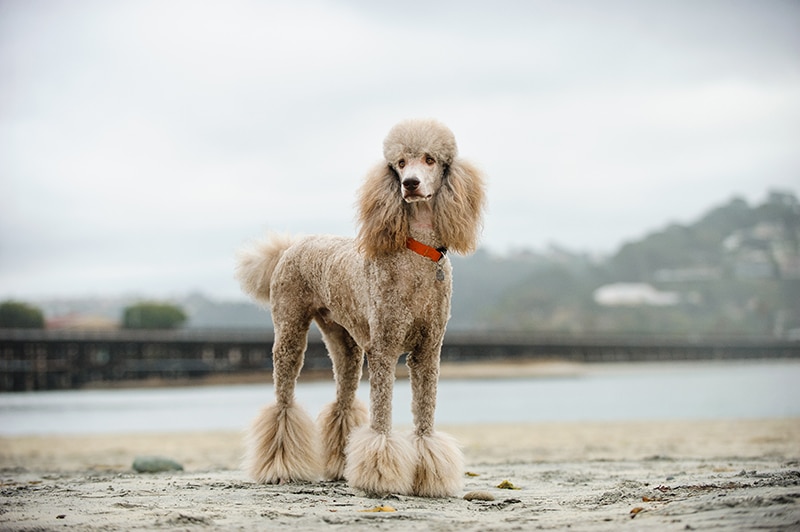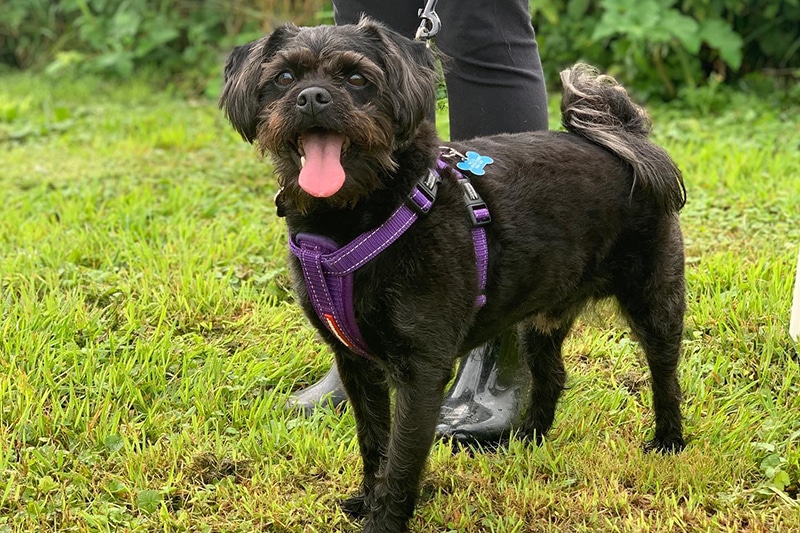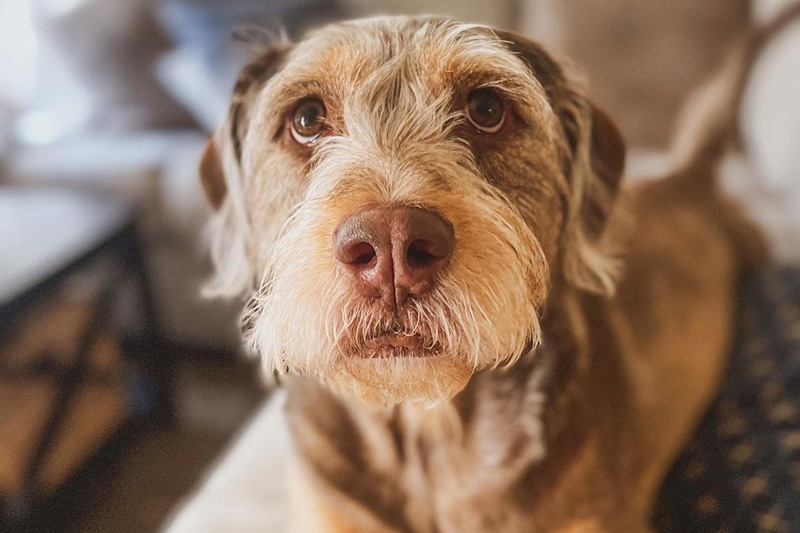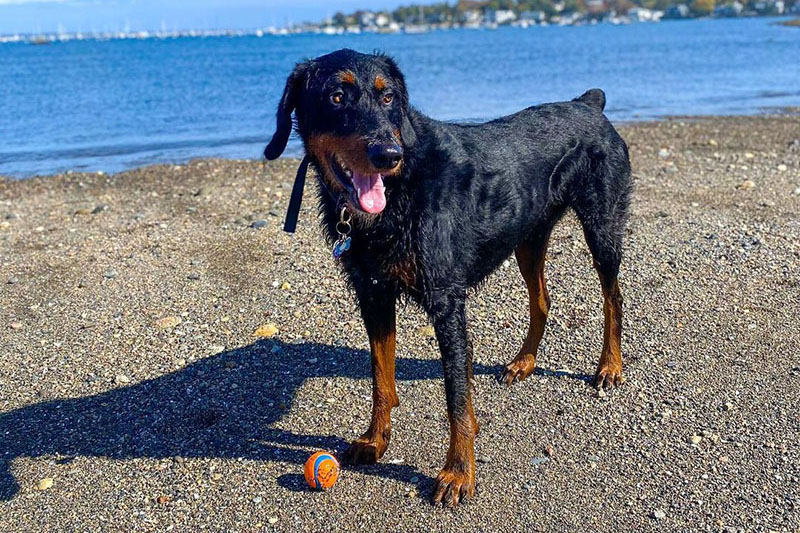The universally loved poodle is of German and French origin, dating back to the 17th century. Their appearance has changed somewhat over the last few centuries, with curls now being the hallmark of the breed. However, luckily for their owners, though they do shed, it gets caught in their curls, rather than ending up on your floor!
While this might not mean that you’ve much vacuuming to do for dog hair, you will be replacing that vacuuming with brushing! You should also fully groom your poodle every four to eight weeks.

Poodle’s Coats
A poodle’s coat is generally very thick and curly in appearance, no matter the subtype – there are several different subtypes and poodles come in a variety of different colour patterns. Luckily for their owners, no matter the subtype, poodles will always come with thick, curly hair. These coats help keep them warm throughout the year and shedding is thankfully fairly well controlled by the thickness of the coat.
Do Poodles Shed?
While poodles do shed, their long, curly, thick coats catch most of the dander – this is part of what makes them hypoallergenic dogs. Hypoallergenic dogs are among the least likely dogs to have their dander cause an allergic reaction. So, if you’ve got family members who are allergic to dogs and are considering getting one – then a poodle might be your best bet!
Though their shedding is minimal, a good brushing routine of once a week is recommended, as their curly hair can sometimes cause heavy matting of their fur, which can be painful for their skin and make it difficult for them to move around if it builds up over time.
Are you looking for a way to treat your furry friend? Sign up for our newsletter for a chance to win a free month of Barkbox!
Are Poodles Hypoallergenic?
Yes, poodles are hypoallergenic dogs and are among the least likely dogs to give folks with dog allergies any issues. Unlike long-haired dogs, Poodles’ dander is trapped in their curly coat, which can then be brushed out. Poodles are great all-around dogs with many families precisely because of their hypoallergenic status.
Other Reasons A Poodle is Losing Hair
If your Poodle is suddenly losing hair, this should generally be a cause for concern – though not necessarily for alarm – as there are a variety of reasons why poodles lose their hair. They can be any of the following:
Stress
Given that poodles are particularly sensitive dogs, they don’t necessarily respond well to stressful situations and/or environments. You may notice that your Poodle’s hair is falling out suddenly – if so, take a minute to examine whether or not you’ve got a lot going on in your personal life and if that stress could be affecting your dog.
Pregnancy
Like in humans, when dogs are pregnant, their hormones can change. In Poodles, one of the ways that this hormone change can manifest is in hair loss. If your Poodle is pregnant, don’t be so alarmed by small amounts of hair loss.
Allergies & Infections
While Poodles are hypoallergenic dogs for humans, this doesn’t mean that they’re protected from potential environmental allergens. If you suspect allergies, you should have your Poodle tested by a vet.
Likewise with skin infections, hair loss can be facilitated by a skin infection. If you’re concerned about hair loss in an area with excess reddening or obvious skin irritation, call your local vet and make an appointment.
Sebaceous Adenitis
Sebaceous Adenitis is a genetic disorder most commonly found in Standard Poodles. This disorder causes hair loss by inflaming the sebaceous glands in the skin, causing hair loss. The disorder is also known to cause cysts, which will need to be drained by a veterinarian.
Cushing’s Disease
Poodles are predisposed to develop a disease known as Cushing’s Disease. Cushing’s Disease can also affect humans, but it is not transmissible between humans and animals. Cushing’s Disease in Poodles involves the overproduction of cortisol, which affects the dog’s stress/infection response, weight management and blood sugar levels. Hair loss is one symptom of Cushing’s.
In general, when your Poodle is shedding, pay attention to how much they shed – if you notice any significant increase, be sure to take them to the vet for a check-up.
How To Manage a Poodle Shedding
You’re never going to be able to get your Poodle to stop shedding – luckily their shedding isn’t a problem for allergies – but one thing you can do to manage a Poodle’s shed is to follow these next few steps carefully.
Brushing
One of the most important elements of shed management is brushing. This should go without saying, but it’s especially important to routinely brush your poodle, as they can develop painful mats in their fur. Poodles should routinely be brushed once per week and then taken to a professional once every couple of months. This will help cut down on the amount of dander that is held within the Poodle’s fur and help prevent matting.
Shampoo
Another effective method of shed management is using the right type of shampoo. There are a variety of great pet shampoos, but a few of these ones are best for managing Poodles’ curls, opening up the hair follicles to allow for dander to fall out.
Diet
Another reason for hair loss might be a sudden change in a Poodle’s diet. This might be something to watch out for if you notice it after a change in food. Certain dietary changes can cause reactions to your Poodle’s skin and fur. Give your vet a call if you start to notice hair falling out in larger quantities after a dietary change.
Supplements
One of the best supplements to help Poodles with matting and oiling their furs is Omega-3 fatty acid. The acids aren’t found naturally within a dog diet, so it’s a welcome addition and comes in either chewable or oil form. Either way, break it into your Poodles’ diet gently and watch their fur transform!
Frequently Asked Questions:
Do Poodles Shed a Lot?
As Poodles have curly fur that helps trap most of their dander, they’re not high on the shedding list for dogs.
Are Poodles The Best Dog for Allergies?
In general, Poodles are among the best dogs for those with dander allergies, as they are hypoallergenic and tend to trap the majority of their dander in their fur, rather than release it into the atmosphere like other dogs. If you’ve got pet allergies yourself, or in the family, consider adopting a Poodle!



